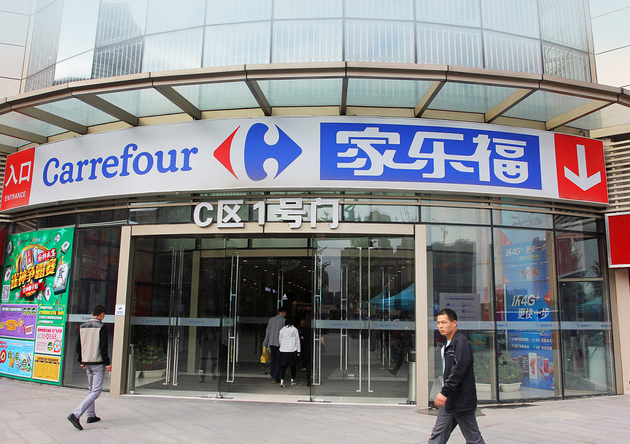
Photo/VCG
May 21 (NBD) -- French hypermarket retailer Carrefour has partnered with Chinese technology giant Tencent to open its first smart store Le Marche on Sunday, a move to foray into the smart retail domain.
The new store is Carrefour's first-ever outlet that combines catering, fresh products and imported goods.
This is not the first time that Carrefour set foot in new business formats beyond hypermarket in the Chinese market. Since the company faced a downturn in its hypermarket business in 2014, it has made investment in convenience stores.
It is the industry trend that encourages Carrefour to enter the smart retail field, the company said.
The Shanghai-based Le Marche store is only a starting point for the company's exploration of new retail formats, said Tang Jianian, CEO of Carrefour China.
In January this year, the hypermarket giant announced that it has reached strategic cooperation with Tencent and supermarket chain Yonghui Superstores (Yonghui).
Tang noted that the country's retail sector is booming now and Carrefour will continue the collaboration with Tencent in this field.
With an area of more than 4,000 square meters, Le Marche will offer over 250,000 types of products. Unlike the Carrefour's hypermarket, the new store houses a fresh food, food processing, and eat-in area, similar to Alibaba's cashless supermarket Hema Fresh.
In addition, the store is supported by Tencent's mobile app WeChat that enables consumers to make payment through facial recognition or code scanning.
Some insiders noted that Carrefour is seeking for a new growth point in China. Last year, while the company reported positive financial results globally, it saw the worst performance in the Chinese market, where it posted a five percent decline and opened 15 new stores but closed five throughout the year.
According to a report released by consulting firm Accenture, with the continually improved and increasingly affordable intelligent technology, retailers expect to offer users excellent consuming experience.
A number of enterprises in the traditional retail industry are exploring new retail formats leveraging digital means and other new technologies, for example, Yonghui's Super Species and Bailian Group's RISO.
It is also noted that the traditional retail sector is showing a gradual recovery. A report on China's top 100 chain brands of 2017 published by the China Chain-Store & Franchise Association (CCFA) shows that combined sales of the top 100 chains amounted to 2.2 trillion yuan (344.5 billion U.S. dollars) last year, a year-on-year rise of 8 percent, accounting for 6 percent of the total consumer goods sales volume. The stores of the top 100 brands numbered 109,800, climbing 9.1 percent year over year.
In 2017, as offline retailers and online platforms conducted effective cooperation, brick-and-mortar retailers showed an increase in scale and performance. The omnichannel business model was widely applied and retailers expanded in offline retail field in different ways, the CCFA concluded.
Yu Yi, managing director of Accenture Digital Greater China, told NBD that the constant emergence of new retail formats signals the revival of the traditional retail industry. In addition to the ability to fulfill consumer demand, maintaining the sustainability of those new formats will be key to lasting revival, Yu added.
Email: zhanglingxiao@nbd.com.cn


 川公网安备 51019002001991号
川公网安备 51019002001991号





